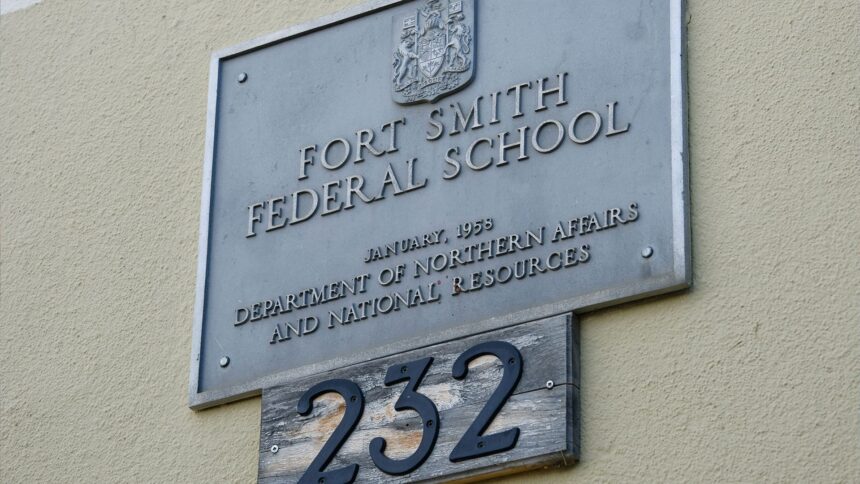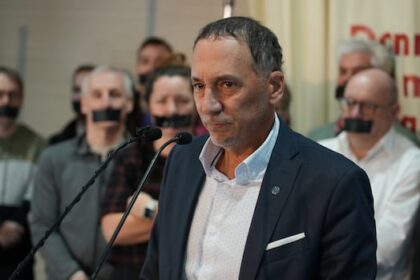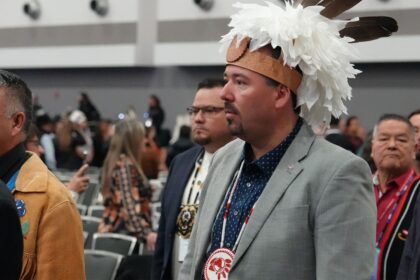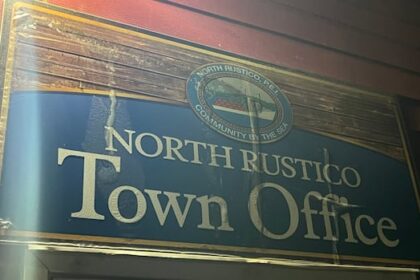Former students of a federal Indian day school in the Northwest Territories say they remember Robert Carney and his time as principal of the school in the 1960s. Robert was the father of Prime Minister Mark Carney. He died in 2009. “He was my principal, he was great,” said Frieda Martselos, who attended Joseph Burr Tyrell (JBT) school in Fort Smith, a town in the southeastern part of the northern territory near the Alberta border. “I don’t have any negative stories,” added Martselos, who is a former chief of Salt River First Nation, 100 kilometres southeast of Fort Smith, and a former MLA for the area. “Everyone who went to school with me there have done very well in their lives.” But not all former students share Martselos’ experience. The national network of federal government-sponsored religious day and residential schools was established in the 1800s to assimilate Indigenous children into Euro-Canadian culture. The schools operated until the late 1900s. The government estimates 150,000 First Nations, Inuit and Métis children were taken from their families and forced into the residential school systems. It said 200,000 were in the day-school system. Survivors have told the Truth and Reconciliation Commission of Canada (TRC) and lawyers for related class-action lawsuits they suffered from homesickness, hunger and fear, along with illness, emotional abuse, loss of language and culture, and physical and sexual abuse. More than 4,000 were confirmed to have died, said the TRC. Bob McLeod, Ethel Blondin-Andrew and Stephen Kakfwi The fact Robert ran JBT, renamed from Fort Smith Federal Day School, is well known in Fort Smith, where Mark was born and occasionally visits. The former governor of the Bank of Canada and Bank of England, is now Canada’s national Liberal Party leader and prime minister after Justin Trudeau stepped down in March. Carney is in the midst of a federal election campaign and has yet to sit down with APTN News despite multiple requests. His camp did not comment for this story after promising to send a statement. Michael Miltenberger, a former MLA for Fort Smith, says Mark’s father was the principal when he joined the school in 1963. He says non-Indigenous children like him were sent to the school, too. Breynat Hall is still standing in Fort Smith, N.W.T., and is being used as a school. Photo: APTN file “There was no other place for us to go,” he told APTN. “There was a planeload of us that came down to Breynat Hall, which was run by the (Catholic missionary) Oblate (priests) for the government. “Mr. Carney was there; I was just a little guy like 13,” Miltenberger added. “I didn’t have too much interaction with the principal, because to go down to the principal’s office wasn’t usually good news.” Breynat Hall, according to the National Centre for Truth and Reconciliation (NCTR), was part of a Canadian government project in the mid-1950s to build day schools and student hostels in larger northern communities. Canada transferred control of the hall to the territorial government in 1969 while the church continued to run it. Like Martselos, Miltenberger has good memories of the place where he finished high school at age 18. He noted a number of prominent people in the N.W.T. were his classmates. “Bob McLeod (former premier) Ethel Blondin-Andrew (former MP), Stephen Kakfwi (former premier) …,” he said. “There’s so many of us that went at the same time that all went on to be professionals, politicians, chiefs, national chiefs, premiers, (government) ministers.” In 2019, APTN published an award-winning series of stories about the system of more than 600 day schools after obtaining records from the Department of Crown-Indigenous Relations through an Access to Information request. The stories revealed harsh conditions in northern and rural schools as a result of poor infrastructure and lack of equipment, and showed proof that Indian Agents – later replaced by principals – used RCMP officers to round up students who were absent. The stories detailed how truancy undermined assimilation efforts and prompted the government to add a residential boarding component to keep students away from their communities. They also included personal accounts from survivors about the harms they suffered. The Trudeau government has settled two major class-action lawsuits from day school (2019 Federal Indian-Mclean Day School Class Action) and residential school (2006 Indian Residential Schools Settlement Agreement) survivors by agreeing to pay billions of dollars for compensation and commemoration. Claudette Commanda, a First Nations Elder and board member of the McLean Day Schools Settlement Corporation Legacy Fund, said the same policies governed day and residential schools, and children were abused at both. She was surprised to learn the prime minister’s father was the administrator of a day school. “This is the first I’m hearing of it,” she told APTN. Day schools and compensation Noeline Villebrun, a former Dene national chief in the N.W.T., said it’s important that voters know the leader of the country has a connection to day schools. “I attended JBT Public School, while staying at Breynat Hall …” she added in an email. “We were sent to Ft. Smith if there was room for us Dene children taken away from parents to support public services.” Villebrun noted she disagreed with Robert’s writings on the residential school system and produced her own replies. The NCTR confirms out-of-town students lived at Breynat Hall while attending school in Fort Smith. One student named Emma Elton died there in 1960, according to the NCTR, which was founded to chronicle the residential school experience in Canada. Survivors from both JBK and Breynat Hall, which operated from the mid-1950s to 1975, received compensation from the day school class-action settlements, court records show. Robert, who had a bachelor’s degree and master’s degree in education, joined the school for the 1962-63 school year, according to the school’s yearbook, the Borean. “We live in a small community, and above all, we live in a small community in Canada’s North, whose very future is dependent on the educational processes that are being carried out in its schools,” he wrote in his principal’s message that year. “What is being done today in the field of education is the greatest investment of Northern endeavour. “So vital is the Educational process, and so important its result,” he continued, “that it goes without saying that every citizen of the Northwest Territories is vitally interested in the work of such a school as ours. “We have a great responsibility to the North, and we must not be easily satisfied with what we do.” ‘Trauma associated with these buildings’ Robert, who died in 2009, was also chief of school programs in the N.W.T. He resigned in 1971 for a faculty post at the University of Alberta. Robert left the university in 1976, to become acting director of the Department of Indian Affairs for the Alberta government. Meanwhile, Martselos, who completed Grades 1 to 12 at JBT, has called for the buildings that house JBT and Paul William Kaeser High School (formerly Grandin College) to be replaced. Grandin was a seminary for boys in Fort Smith between 1960 and 1985, according to the NCTR. “Numerous people have told me over the years that it can be hard sometimes to enter or even go in these buildings because it is a constant reminder, living reminder, of the personal and intergenerational trauma from residential schools,” Martselos told the territorial legislature in 2021. “Educators have tried their best to make JBT and PWK as welcoming as they can but no matter how hard they try, they can never change the feeling and the trauma that is associated with these buildings.” At the time, Martselos cited a Historica Canada report that nine of 14 residential school buildings were still standing in the N.W.T., with two operating as schools in Fort Smith. The education minister at the time rejected the idea of replacing the buildings. “There was a residence there owned by the Catholic Church. That’s what I wanted torn down,” Martselos clarified in an interview Monday. “The school is still standing. The school was incredible to me. “It was all very positive. I think that has to come out.” The National Residential School Crisis Line 1-866-925-4419 is available 24/7. Continue Reading
Mark Carneys dad was the principal of a N.W.T. day school: survivors

Leave a Comment










